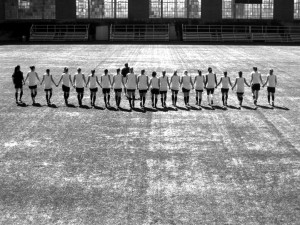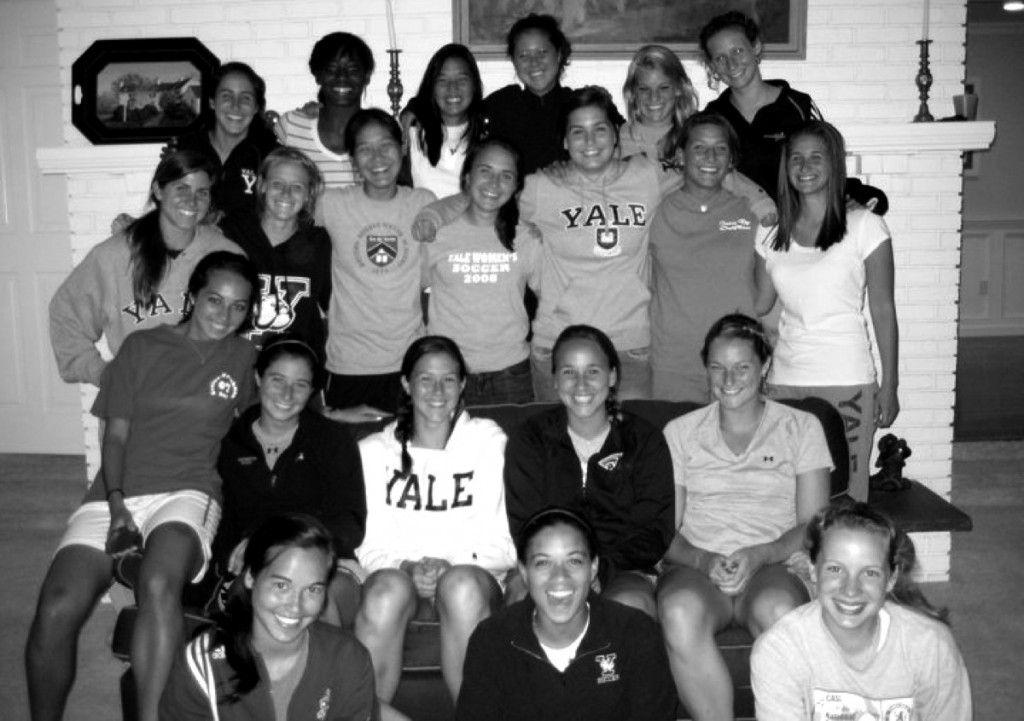
The Beautiful Game. The game said to bring the whole world together. I watched this summer’s World Cup in Paris, France; I have never seen much fervent passion, pride and celebration surrounding the game of soccer. Banners and flags waved from terraces, thousands sat in front of JumboTrons, wine glasses and beer mugs clinked after victories. There were hurrahs, yipees, and profanities. Sometimes, there were riots in the streets. Before the kickoff, bets were high on Brazil, Spain, and the Netherlands. Nevertheless, folks from across the world wore the flags, shirts, and jerseys of their home country—and could proudly tell you their own team would win. Americans, however, were quieter about their allegiance. Bold as our country’s reputation may be, we aren’t quick to proclaim soccer-supremacy. We have yet to win a World Cup. The fact of the matter is, in the soccer world, America does not get much respect, even from its own citizens. When it comes to baseball, we’ve stepped up to the plate. At basketball, we’ve made a slam-dunk. For football, we need no Hail Mary. Soccer, however, is a whole different ballgame.
Some Europeans say our weakness lies in the way we train our players. In Europe, childrens are sent to rigorous soccer training schools in hopes of someday scoring a professional club contract. Often, they push education aside. There, passion for the game is inseparable from a drive to win. In America, where professional soccer takes a back seat to other sports, the primary stage for the sport’s higher levels are on college fields. There, players often prioritize school over sports, especially at rigorous schools like Yale. But the teams’ passion for the game runs strong regardless of the score.
A sophomore on Yale’s Women’s Soccer team, I’ve witnessed our season—the growth and the disappointments. Our competitive line-up proved difficult, stacked with nationally ranked teams: Duke, Boston College, Illinois, UConn. It was a tough road to travel, but while an outsider might use more colorful adjectives to rub salt in our turf burns, many of our losses were close (1-0, 2-0). Against great competition, we began to develop our style of play.
Our coach, Rudy Meredith, provides his wisdom. “Number 1: We want to play against the best. Number 2: This way we have a better understanding of where we are. Maybe we scheduled too many tough games in a row, but it is the best feeling in world when you can get such an upset,” he says of facing difficult opponents.
The odds are against us. Since Yale holds high academic standards, and it doesn’t offer athletic scholarships as many of its counterparts do, we’re at a disadvantage in recruitment. “Stanford has the best model,” Rudy explains. “They have good academics and scholarships and they are top five in the country. And they went to the Final Four last year too. If we had scholarships we could be just like them.” The academic standard for Yale’s prospective recruits is only increasing.“It’s tough. You are narrowing the pool again to get the best athlete. But we are at Yale University,” he continues.
For an Ivy League school, beating the odds takes a lot of work, determination, and dedication. In 2004, Princeton made it to the Final Four. And no one on our team has forgotten 2005 (since there is not a week where Coach does not bring it up); that year, Yale was ranked 13th in the nation with a win against Duke under its belt. Eleni Benson, the captain at the time, graduated with the highest GPA on the team and went off to play with the Greek national team in the women’s World Cup. During her Yale Career, she helped lead YWS to win the Ivy League Championships and enter the NCAA tournament.
I am happy to say that I was a part of the shake-up of 2010. In our season opener we faced Penn State, then 16th in the nation. Shaking with anxiety, we had no idea what to expect from our preseason preparation—while Penn State strolled in unfazed, ready to crush an Ivy. But when the whistle blew, I felt a raw energy in the air. The exhilaration rose when we realized we were dominating the head-balls, dribbling through defenders, and tackling dangerous plays. On the bench, we stood up chanting “Let’s go Blue!” with zeal. In the game’s last half hour, Becky Brown ’11 slotted one in on a breakaway, and all the Bulldogs on the sideline jumped up, screaming, hugging, and laughing. The game ended: 1-0, Yale. We all took scissors to the Yale Daily News article the next day to post that large picture of the team running to embrace Becky on our walls. “Elis pulled off the upset of Nittany Lions, earning the program’s first win against a Big Ten team in school history,” read the caption.

From that tremendous high, we stumbled through the next few games, but every day, we kept Penn State in the back of our minds, remembering what we could accomplish. We longed for the Ivy League ring—the mark of an athletic championship amongst eight schools known for their academics.
“Student-athletes that come here don’t make the decision to come to Yale lightly,” says teammate Miyuki Hino ’12. “There are athletes that choose not to come to Yale because it’s too much academically, and they’d rather go somewhere they can coast through their four years while focusing on sports. It’s often overlooked, but it’s a rare breed that is willing to compete academically with non-athletes,” she explains.
On Yale Women’s Soccer, we came to Yale with a drive for academics and thrive on soccer’s fast-paced competition. For this reason, Rudy says, “We train 4-5 times a day like a professional team anywhere in the world. Obviously they have class everyday but people are working hard to achieve their goals. I am preparing kids to be productive. The Yale name can only take you so far if you are not productive.” Under the pressure of Division I competition, we learn to push ourselves through game-time, midterms and papers. We want to win against the other Ivies—Brown, Penn, Cornell, Columbia, Dartmouth, Harvard. Even Princeton matters.
When this year’s season moved to Ivy-League play, however, we were disappointed. On occasion we would pull a win, but things would never quite work when it mattered. Finishing fifth in the league did not reflect our hard work or our capabilities. Win or lose, we are very grateful for everything Yale Women’s Soccer has given us. “After playing for four years, I’ve learned that the important things are not having the most championships, but maintaining a constant love for the game surrounded by a family (the team),” explains Natalie Romine ’11.
Yale Women’s Soccer is about the team. For athletes and non-athletes alike, the best times in college are not those spent in lecture halls or the bent over textbooks—our social interactions are most important. Be it on the field, on the stage or in the newsroom, challenges bring us together. Says teammate Emma Mullo ’12, “Playing three seasons, I am blessed to say that I got exactly what I was looking for—an extremely rigorous academic setting and immensely competitive athletic world. I could not ask for more out of my experience. I love my YWS family here. I have learned more from being part of this team than anything I could have learned in books,” she shares.
Senior day—for reasons perhaps more social than athletic—was the pinnacle of our season. Senior Day is the last home game of the season—it’s always marked by speeches and celebration for our oldest players. Our game was scheduled after the men’s game, but theirs went into overtime, and we had to wait. The women’s team sat in the locker room as Rudy gave the pre-game talk. Suddenly, Rudy said “I have a surprise for you guys.” We looked at each other and shuffled our cleats in anticipation. The lights dimmed and a projector lit up the white board. Rudy sat down in a chair at the front and pulled out a saxophone. He shifted his chair a little and drew deep breaths. “All right, I’m a little nervous,” he told us. “Whew.” He lifted his instrument to his lips and began to play “My Heart Will Go On.” A slideshow started. Pictures of the seniors faded in and out as Rudy’s music brought us to tears.
When the slideshow finished, Rudy played Stevie Wonder’s “I Wish” with CD accompaniment, and we all danced. It was like a live band was there just for us—we hopped, skipped, and boogied with not a care in the world. I sweat with these girls everyday—that day, we sweated in celebration. We rode the high enthusiasm from the dance party into the game against Columbia. We celebrated our first goal with a group dance on the field. The energy we’d had in the Penn game was back. We beat Columbia, 2-0. And it wasn’t the best part of the day.

